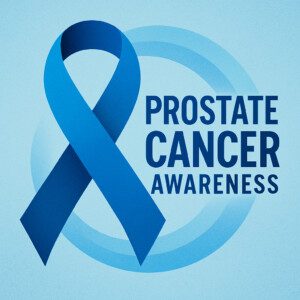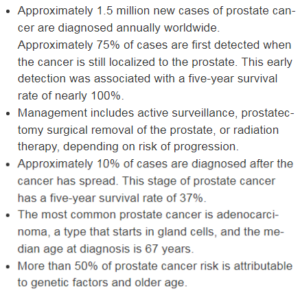
Where’s the publicity for prostate cancer? It’s a myth it’s a “good” cancer; it’s expected to kill 26,700 U.S. men this year despite 161,360 new diagnoses.
It’s an ugly disease, even though most men with prostate cancer will not die from it, though they’ll die with it.
This last data point may sound encouraging, but it’s no consolation to the millions of men affected by this disease who must endure long and painful treatments and lifelong anxiety over PSA levels and checkup scans.
Prostate Cancer Publicity
Do you even know the color for prostate cancer awareness? Well, it’s logically blue, but here’s another question: When’s the last time you saw an ad on a bus, public bench or anywhere else relating to prostate cancer awareness?
Why There’s So Little Prostate Cancer Awareness
“This is a great question without a simple answer,” begins Michael Herman, MD, director of urologic oncology at South Nassau Communities Hospital in Oceanside, NY.
“I do think that men tend to talk less about their medical conditions, both with each other and with their physicians,” says Dr. Herman.
Women, on the other hand, will freely discuss anything under the sun – even with women they just met.
Men? Well, they talk too – about cars, building muscle, their jobs, power tools, golf clubs, gun collection, wine, best burgers in town … but there’s just no potential in all that to bring up prostate health.
Better to focus on talking about less threatening topics – such as missile strikes in foreign lands, gas prices, hair loss and the President’s latest tweet.
Really, how many men feel comfortable talking about their prostate with other men, especially men they just met in a gym locker room, at a party, at a barbecue or what-have-you?
“It’s not uncommon for someone’s wife or partner to push them to get checked for prostate cancer,” adds Dr. Herman.
More Reasons for Prostate Cancer’s Lukewarm Level of Publicity
“Also, prostate cancer treatment can cause side effects that are difficult to talk about,” says Dr. Herman. “Even with increased awareness, it’s not easy to discuss urinary incontinence or problems with sexual function.
“This means that there are fewer celebrities or other well-known people who can act as spokesmen for the disease.
“Lastly, there are a lot of mixed messages about prostate cancer itself. Although it is true that most prostate cancers are not aggressive, there are some prostate cancers that are indeed deadly.
“There is debate about which prostate cancers even need to be treated. This makes it very confusing for patients about whether or not they should be checked for prostate cancer.
“Then, if a man is diagnosed with prostate cancer, there are pros and cons about each of the different treatment options.
“All of this makes for a lot of confusion. The best way to increase awareness is for all the stakeholders to come together and continue talking about prostate cancer. This includes physicians, patients and their loved ones.
“As we continue talking about this condition, more and more men will be willing to come forward and tell their stories.”
Remember blue for prostate cancer.





































